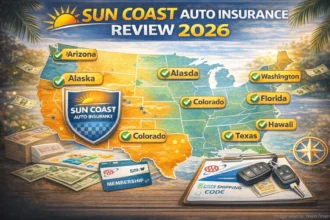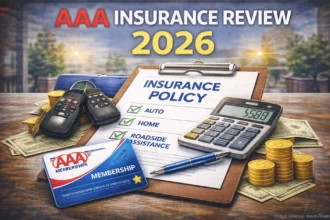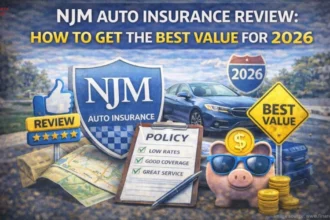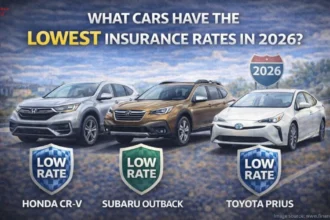
The $2,670 Question: Why Car Ownership Matters for Insurance
You’re driving your roommate’s car daily, your elderly parent needs help with their vehicle, or you’re making payments on a car still titled to the dealer. The question hits you: “Can I insure a car not in my name?“
Here’s the reality that catches 73% of Americans off-guard: Most insurance companies will flat-out refuse to insure a vehicle you don’t legally own. But before you panic, there are several legal workarounds that could save you thousands in liability costs.
Compare Insurance Rates Now – See What You Qualify For →
Why Insurance Companies Say “No” to Non-Owners
The insurance industry operates on a fundamental principle called “insurable interest.” Think of it as financial skin in the game. Insurance companies need proof that you’d suffer a genuine financial loss if something happened to the vehicle.
The Two-Part Test Insurance Companies Use:
1. Insurable Interest: Do you have a financial stake in the vehicle?
2. Care, Custody, and Control: Are you responsible for maintaining, storing, and controlling access to the car?
When you can’t prove both, red flags go up. Insurance fraud costs Americans $40 billion annually, and insurers are increasingly vigilant about suspicious arrangements.
Legal Ways to Insure a Car Not in Your Name
1. Household Members and Family Coverage
What Works:
- Spouse’s car (even if only in their name)
- Adult children living at home
- Elderly parents’ vehicles you help maintain
- Roommates sharing a household
The Key Factor: You must live at the same address and demonstrate regular use of the vehicle.
2. Non-Owner Car Insurance: Your Safety Net
For drivers who regularly use vehicles they don’t own, non-owner insurance provides crucial liability protection. Here’s what it covers:
✓ Liability coverage for injuries you cause
✓ Property damage to other vehicles
✓ Legal defense costs
✗ Damage to the car you’re driving
✗ Your own medical bills
Average Cost: $200-$500 annually (significantly less than standard policies averaging $2,670)
Get Non-Owner Insurance Quotes – Compare Top Providers →
3. Co-Ownership and Title Transfer Options
Private Payment Agreements: If you’re making payments on a vehicle with a written agreement, some insurers will provide coverage with proper documentation.
Adding Your Name to the Title: The most straightforward solution, but requires cooperation from the current owner.
State-by-State Variations: What You Need to Know
Insurance regulations vary significantly across states. Here’s what impacts your options:
Strict Title-Match States: California, New York, and Florida require insurance policies to match vehicle registration closely.
Flexible States: Texas, Arizona, and Nevada offer more leeway for family arrangements and roommate situations.
No-Fault States: Michigan, New York, and 10 other states have additional complications for non-owner coverage.
The Hidden Costs of Getting It Wrong
Financial Risks:
- Claim Denials: Your insurer could refuse to pay, leaving you with thousands in out-of-pocket expenses
- Policy Cancellation: Material misrepresentation can void your entire policy
- Legal Liability: You could face personal lawsuits exceeding policy limits
Real-World Example:
“A Reddit user asked about adding their father’s out-of-state car to their policy. This arrangement could have resulted in policy cancellation for misrepresentation, leaving both parties uninsured.”
Smart Alternatives When Standard Insurance Won’t Work
Option 1: Get Added to the Owner’s Policy
Best For: Family members, roommates, regular borrowers
Cost: Typically $300-$800 annually added to existing policy
Option 2: Umbrella Liability Coverage
Best For: High-net-worth individuals needing extra protection
Coverage: $1-5 million in additional liability
Cost: $200-$400 annually
Option 3: Pay-Per-Mile Insurance
Best For: Occasional drivers
Providers: Metromile, Root, Nationwide
Savings: Up to 40% for low-mileage drivers
Compare All Insurance Options – Find Your Best Rate →
Comparison: Your Coverage Options at a Glance
| Coverage Type | Monthly Cost | Liability Protection | Vehicle Damage | Best For |
| Standard Policy | $180-$280 | High | Yes | Vehicle owners |
| Non-Owner Policy | $17-$42 | Medium | No | Regular borrowers |
| Added Driver | $25-$67 | High | Yes | Household members |
| Umbrella Policy | $17-$33 | Very High | No | High-risk situations |
Red Flags That Could Cancel Your Policy

What NOT to Do:
- Rate Skipping: Lying about where the car is kept to get cheaper rates
- Fronting: Having a parent insure a car primarily driven by a young adult living elsewhere
- False Addresses: Using a different address to avoid high-risk ZIP codes
The Consequences:
Insurance fraud charges can result in fines up to $50,000 and potential jail time in severe cases.
2025 Trends Affecting Non-Owner Coverage
Increasing Availability:
More insurers are offering non-owner policies as gig work and car-sharing grow.
Technology Integration:
Usage-based insurance programs are making coverage more flexible for occasional drivers.
Regulatory Changes:
Several states are considering legislation to make non-owner coverage more accessible.
Expert Tips for Getting Coverage Approved
1. Be Completely Transparent
“Honesty is crucial when explaining your situation to insurers. Any misrepresentation can void your policy when you need it most.” – National Association of Insurance Commissioners
2. Shop Multiple Providers
Coverage policies vary significantly between insurers. Companies like Progressive, GEICO, and State Farm have different criteria for non-standard situations.
3. Document Everything
Keep written agreements, proof of residence, and any other documentation that supports your insurable interest.
Get Personalized Insurance Quotes – Compare Top Providers →
Frequently Asked Questions
Q: Can I insure my girlfriend’s car?
A: Only if you live together and can demonstrate care, custody, and control of the vehicle.
Q: What if I’m making payments on a car not in my name?
A: Some insurers will provide coverage with a written payment agreement, but you’ll need to shop around.
Q: Does non-owner insurance cover rental cars?
A: Yes, non-owner policies typically provide liability coverage for rental vehicles.
Q: Can I get full coverage with non-owner insurance?
A: No, non-owner policies only provide liability coverage, not comprehensive or collision.
READ ALSO: The 10 Cheapest Cars to Insure in 2025 (Save Up to $4,426 Annually)
Take Action: Your Next Steps
The car insurance landscape is complex, but you have options. Whether you need non-owner coverage, want to be added to an existing policy, or are exploring title transfer options, the key is acting quickly.
Remember: Insurance rates change daily, and the best deals don’t last long. Many Americans overpay simply because they don’t shop around or understand their options.
Compare Insurance Rates Now – See What You Qualify For Today →
Don’t let another day pass without proper coverage. Your financial future depends on making the right choice now.
In another related article, Dodge Car Insurance: Complete Guide to Rates, Savings & Best Providers for 2025





